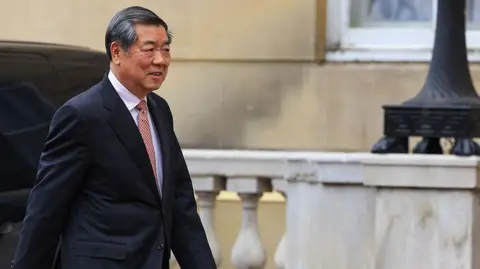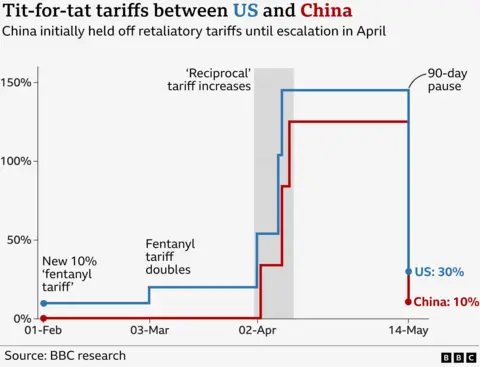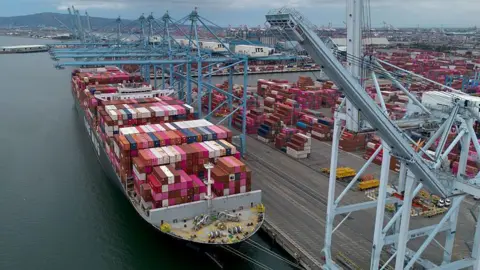US and China meet for trade talks in London
 Bloomberg/Getty
Bloomberg/GettyA new round of talks aimed at resolving the trade war between the US and China has started in central London.
A senior US delegation including Commerce Secretary Howard Lutnick met Chinese representatives such as Vice Premier He Lifeng at Lancaster House to resolve tension between the world's two largest economies, which is threatening global growth.
Chinese exports of rare earths, which are crucial for modern technology, as well as Beijing's access to US products, including computer chips, are expected to be high on the agenda.
Last month, Washington and Beijing agreed a temporary truce over trade tariffs but each country has since accused the other of breaching the deal.
The US says China has been slow to release exports of rare earth metals and magnets which are essential for manufacturing everything from smartphones to electric vehicles.
Meanwhile, Washington has restricted China's access to US goods such as semiconductors and other related technologies linked to artificial intelligence (AI).
The new round of negotiations follows a phone call between Donald Trump and China's leader Xi Jinping last week which the US President described as a "very good talk".
The call - the first between the two leaders since the trade war erupted in February - "resulted in a very positive conclusion for both countries", Trump said.
According to Chinese state news agency Xinhua, Xi told Trump that the US should "withdraw the negative measures it has taken against China".
White House economist Kevin Hassett, who leads the National Economic Council, told CNBC on Monday that he was expecting "a short meeting" that would end in a "big strong handshake", with the two sides agreeing to ease their respective barriers in those critical areas.
"Our expectation is that after the handshake, immediately after the handshake, any export controls from the US will be eased and the rare earths will be released in volume and then we can go back to negotiating smaller matters," he said.
But he acknowledged that the US expected to preserve restrictions on some of the most advanced computer chips.

The inclusion of Lutnick in this week's meetings with China is "a welcome addition", according to Swetha Ramachandran, fund manager at Artemis, since he is "behind some of the very harsh export controls of technology to China".
She told the BBC's Today programme: "Some of the focus certainly seems to be on rare earths where China, of course, has dominance in terms of producing.
"They mine 69% of the rare earths globally that are quite essential to technology development in the US so I think there are enough chips on the table here that could make it acceptable for both sides to walk away with desired outcomes."
As well as Lutnick, US Treasury Secretary Scott Bessent and Trade Representative Jamieson Greer is meeting Chinese officials in London.
When Trump announced sweeping tariffs on imports from a number of countries earlier this year, China was the hardest hit. Beijing responded with its own higher rates on US imports, and this triggered tit-for-tat increases that peaked at 145%.
In May, talks held in Switzerland led to a temporary truce that Trump called a "total reset".
It brought US tariffs on Chinese products down to 30%, while Beijing slashed levies on US imports to 10% and promised to lift barriers on critical mineral exports. It gave both sides a 90-day deadline to try to reach a trade deal.
But the US and China have since claimed breaches on non-tariff pledges.
Greer said China had failed to roll-back restrictions on exports of rare earth magnets.
Beijing said US violations of the agreement included stopping sales of computer chip design software to Chinese companies, warning against using chips made by Chinese tech giant Huawei and cancelling visas for Chinese students.
On Saturday, the Chinese Ministry of Commerce said it had approved some applications for rare earth export licences, although it did not provide details of which countries were involved.
Trump said on Friday that Xi had agreed to restart trade in rare earth materials.
But speaking on Sunday, Mr Hassett told CBS News that "those exports of critical minerals have been getting released at a rate that is, you know, higher than it was, but not as high as we believe we agreed to in Geneva".
 Getty Images
Getty ImagesPrior to talks with the US, He met UK Chancellor Rachel Reeves on Sunday where the vice premier said China and the UK should maintain and deepen communication and cooperation across economics and finance, according to a report by state broadcaster CCTV.
China wants to build a new embassy at Royal Mint Court, a building complex close to the City of London which is home to the UK financial industry. Beijing bought the site in 2018.
The US has reportedly raised concerns about the proposed embassy's proximity to sensitive infrastructure underpinning banks and institutions.
The UK is in talks to finalise an agreement with the US over tariffs, which must be signed by 9 July or British exports of steel will face higher taxes when they reach American ports.
Economists have warned that Trump's trade policy will impact the global economy.
The Organization for Economic Co-operation and Development said it now expected worldwide economic growth to be a "modest" 2.9%, down from a previous forecast of 3.1%.
It blamed a "significant" rise in trade barriers and warned that "weakened economic prospects will be felt around the world, with almost no exception".
New data released by Bejing on Monday showed China's exports in May were lower than analysts expected.
China's exports in dollar terms increased by 4.8% compared to the same time last year.
At the same time imports dropped by 3.4%, which was much worse than the 0.9% fall predicted.
